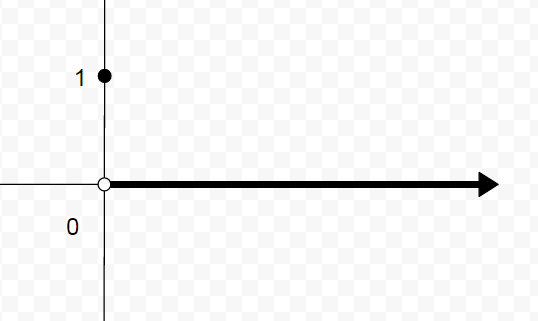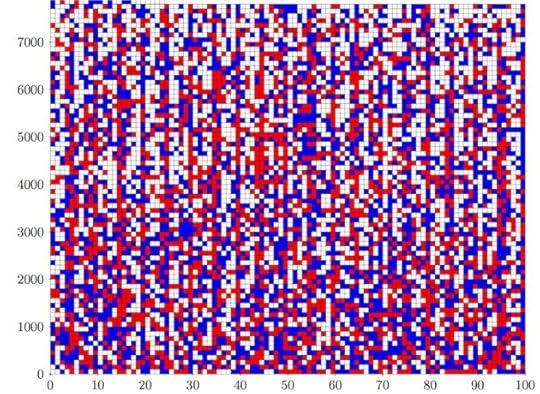John C. Baez's Blog, page 72
June 28, 2016
Large Countable Ordinals (Part 1)
I love the infinite.
It may not exist in the physical world, but we can set up rules to think about it in consistent ways, and then it’s a helpful concept. The reason is that infinity can be simpler to think about than a very large finite number.
Finding rules to work with the infinite is one of the great triumphs of mathematics. Cantor’s realization that there are different sizes of infinity is truly wondrous—and by now, it’s part of the everyday bread and butter of mathematics.
Trying to cr...
June 24, 2016
Exponential Zero
guest post by David A. Tanzer
Here is a mathematical riddle. Consider the function below, which is undefined for negative values, sends zero to one, and sends positive values to zero. Can you come up with a nice compact formula for this function, which uses only the basic arithmetic operations, such as addition, division and powers? You can’t use any special functions, including things like sign and step functions, which are by definition discontinuous.

In college, I ran around showing peopl...
A Quirky Function
guest post by David Tanzer
Here is a mathematical riddle. Consider the function below, which is undefined for negative values, sends zero to one, and sends positive values to zero. Can you come up with a nice compact formula for this function, which uses only the basic arithmetic operations, such as addition, division and exponentiation? You can’t use any special functions, including things like sign and step functions, which are by definition discontinuous.

In college, I ran around showing...
June 10, 2016
Azimuth News (Part 5)

I’ve been rather quiet about Azimuth projects lately, because I’ve been too busy actually working on them. Here’s some of what’s happening:
• Jason Erbele is finishing his thesis, entitled Categories in Control: Applied PROPs. He successfully gave his thesis defense on Wednesday June 8th, but he needs to polish it up some more. Building on the material in our paper “Categories in control”, he’s defined a category where the morphisms are signal flow diagrams. But interestingly, not all th...
June 4, 2016
Programming with Data Flow Graphs
Network theory is catching on—in a very practical way!
Google recently started a new open source library called TensorFlow. It’s for software built using data flow graphs. These are graphs where the edges represent tensors—that is, multidimensional arrays of numbers—and the nodes represent operations on tensors. Thus, they are reminiscent of the spin networks used in quantum gravity and gauge theory, or the tensor networks used in renormalization theory. However, I bet the operations involved...
May 28, 2016
Very Long Proofs

In the 1980s, the mathematician Ronald Graham asked if it’s possible to color each positive integer either red or blue, so that no triple of integers  obeying Pythagoras’ famous equation:
obeying Pythagoras’ famous equation:

all have the same color. He offered a prize of $100.
Now it’s been solved! The answer is no. You can do it for numbers up to 7824, and a solution is shown in this picture. But you can’t do it for numbers up to 7825.
To prove this, you could try all the ways of coloring these numbers and show that noth...
May 21, 2016
The Busy Beaver Game

This month, a bunch of ‘logic hackers’ have been seeking to determine the precise boundary between the knowable and the unknowable. The challenge has been around for a long time. But only now have people taken it up with the kind of world-wide teamwork that the internet enables.
A Turing machine is a simple model of a computer. Imagine a machine that has some finite number of states, say N states. It’s attached to a tape, an infinitely long tape with lots of squares, with either a 0 or 1...
May 7, 2016
Vehicle-to-Grid
One of the big problems with intermittent power sources like wind and solar is the difficulty of storing energy. But if we ever get a lot of electric vehicles, we’ll have a lot of batteries—and at any time, most of these vehicles are parked. So, they can be connected to the power grid.
This leads to the concept of vehicle-to-grid or V2G. In a V2G system, electric vehicles can connect to the grid, with electricity flowing from the grid to the vehicle or back. Cars can help solve the energy st...
May 5, 2016
Shelves and the Infinite
A shelf is a set with a binary operation  that distributes over itself:
that distributes over itself:

There are lots of examples, the simplest being any group, where we define

They have a nice connection to knot theory, which you can see here if you think hard:

My former student Alissa Crans, who invented the term ‘shelf’, has written a lot about them, starting here:
• Alissa Crans, Lie 2-Algebras, Chapter 3.1: Shelves, Racks, Spindles and Quandles, Ph.D. thesis, U.C. Riverside, 2004.
I could tell you a long and entert...
April 21, 2016
Bleaching of the Great Barrier Reef

The chatter of gossip distracts us from the really big story, the Anthropocene: the new geological era we are bringing about. Here’s something that should be dominating the headlines: Most of the Great Barrier Reef, the world’s largest coral reef system, now looks like a ghostly graveyard.
Most corals are colonies of tiny genetically identical animals called polyps. Over centuries, their skeletons build up reefs, which are havens for many kinds of sea life. Some polyps catch their own food...
John C. Baez's Blog
- John C. Baez's profile
- 29 followers




